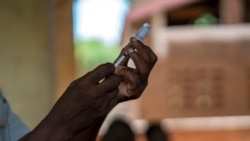The Delta variant of the SARS-CoV-2 virus is responsible for most cases of coronavirus infections worldwide, scientists say. The COVID-19 vaccines work well against the variant so far. Fully vaccinated people who get infected rarely require hospital stays or die from the disease, medical experts say. But scientists continue to watch Delta closely for changes.
Delta
The Delta variant, first identified in India in December 2020, remains the most troubling kind of SARS-CoV-2 virus.
The World Health Organization describes Delta as a variant of concern. That means the variant can increase disease spread, cause more severe disease or reduce the effects of vaccines and treatments.
Shane Crotty is a virus expert at the La Jolla Institute for Immunology in San Diego. He described Delta’s ability to spread as a “superpower.”
Delta is able to spread more than two times faster than other SARS-CoV-2 variants, says the U.S. Centers for Disease Control and Prevention. Studies suggest it may be more likely to put infected people in the hospital than earlier forms of the virus.
Delta also can cause symptoms two to three days sooner than the original SARS-CoV-2, giving the immune system less time to put up a defense.
People infected with Delta carry around 1,200 times more virus in their noses compared with the first kind of the coronavirus. The amount of virus in vaccinated individuals who become infected with Delta is about the same as those who are unvaccinated. And both vaccinated and unvaccinated people can spread the virus to others.
In vaccinated people, however, the amount of virus drops more quickly, so they likely spread the virus for a shorter time.
The WHO says Delta makes up 99.5 percent of all genetic samples of coronavirus infection reported to public databases.
However, in South America, where Delta has spread more slowly, other variants such as Gamma, Lambda and Mu still make up a large number of reported cases.
Many vaccine experts predict that all future variants will develop from Delta. One such variant is known as AY.4.2. In Britain, the variant represents 10 percent of virus samples.
The British government’s health security agency has named the AY.4.2 a "Variant Under Investigation." Officials say an early study suggests the variant does not substantially reduce vaccine effectiveness in comparison to Delta. However, there is some evidence that AY.4.2 could spread more easily than the older Delta, the agency said.
AY.4.2 has spread to at least 42 countries, including the United States.
More on the way?
Virus experts are closely watching the evolution of Delta.
While current vaccines prevent severe disease and death, they do not block infection. A person can be fully vaccinated and still carry and pass the virus.
What is needed to defeat SARS-CoV-2 is likely a new kind of vaccine that also blocks virus spread, said Dr. Gregory Poland, a vaccine developer at the Mayo Clinic. Until then, Poland and other experts say, the world remains easily hurt by the virus.
I’m John Russell.
Julie Steenhuysen reported on this story for Reuters. John Russell adapted it for Learning English. Caty Weaver was the editor.
__________________________________________________
Words in This Story
variant – n. different in some way from others of the same kind
symptom – n. a change in the body or mind which indicates that a disease is present
evolution – n. a process of change in a certain direction






